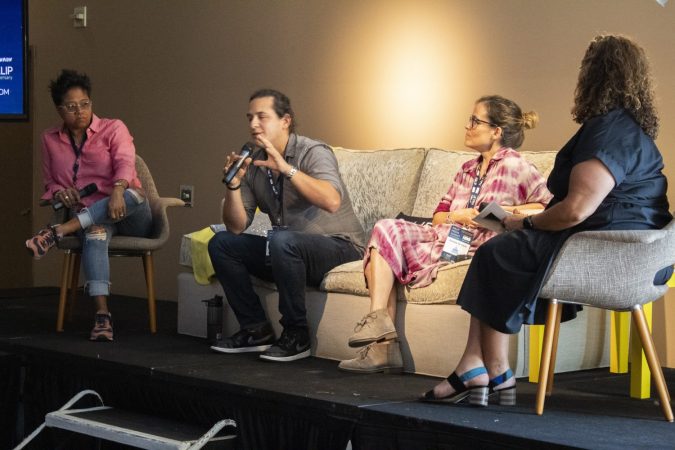One of the ways the entertainment industry has tried to course-correct its biases against minorities when handing out directing and writing roles and responsibilities is through diversity initiatives. These programs sound great on paper: TV networks, say, get people from underrepresented communities to apply, presumably prove their worth, and get a chance to see firsthand what it’s like to produce a television show. But, Latinx creators need more from programs that are designed to give them a leg up; they need actual opportunities to go alongside such mentoring initiatives. This is precisely what the NBC Emerging Director Program is doing: on top of getting directors who are eager to move into TV to shadow episodic production and learn the ropes while on a specific show, they also get a chance to direct one episode themselves. It’s the latter opportunity that makes the program stand out from others across the industry.
At this year’s National Association of Latino Independent Producers (NALIP) Media Summit, Karen Horne, senior vice president of programming talent development and inclusion for NBC Entertainment and Universal Television Studios, moderated a conversation with three directors who’d gone through the aforementioned process. They shared what they’d learned from directing their very first TV episode. All three, as is the case for all chosen NBC fellows, were accomplished filmmakers in their own right. Detroit-born Christine Swanson had directed more than four feature films before she helmed an episode of Chicago P.D. Argentine Daniela De Carlo had two movies, including a Brazilian romantic comedy, under her belt before she landed on Chicago Med. San Antonio native Steve Acevedo had cut his teeth directing and working as a cinematographer on shorts and commercials in his hometown before directing an episode of Queen of the South. These were not directors who needed guidance when it came to their craft. Instead, what the Emerging Director Program offered them was a crash course in the specific skill set required to direct for TV.
Acevedo, who shadowed his first show (Burn Notice) back in 2011 when he was part of an ABC fellowship program, only just got his first TV directing gig this year when brought on to work on an episode of the USA narco drama. All in all, he estimated he’s spent over 36 weeks on sets shadowing over 12 different directors across a variety of different shows. On paper, that sounds like a lot of time. And it was — a firm example of how certain people in this industry have to work twice as hard to get half as far. But, knowing he needed to use all those hours as best as he could, Acevedo took it upon himself to improve on the skills he knew he was lacking. Working with inexperienced actors — with kids, even — was something he needed to work on, which is why he started directing acting reels as practice.

That came in handy while on set of Queen of the South, specifically during a conversation with a co-star in a brief scene. “I gave her a lot of direction,” he shared, “I gave her a little bit of care. And it wasn’t anything spectacular. It was literally just like, ‘This is the part and so this is your character. This is what’s happening, and this is what you need to do.’ And it was a really weird experience: she actually thanked me.”
“Directors don’t talk to me,” she told him. He was reminded that his attention to actors actually helped him stand out and better the scene at hand. It underscored the refrain that guided the entire conversation: the importance of building strong relationships — with crew, executive producers, actors and writers.
“Yes, the material is written,” De Carlo shared, “but they want your vision, and they want your sensibility and your idiosyncrasies — to come in and be part of the project and to make it better. And what I realized is the way to make it better for me was to take risks, to follow my intuition, even when I felt really vulnerable.”
If, as Swanson offered, TV is a writer’s medium, then directors who are eager to move into TV need to understand that they’re coming in as guests and are there to serve a story and a vision that’s not necessarily their own. In that, it can sometimes feel like you’re supposed to be subservient or merely thankful for the opportunity — a feeling not uncommon when you’re a person of color finally being given a chance to break into a role you’ve always dreamed of. But all three former fellows stressed that you need to find a way to make yourself be heard, make it clear that you belong on that set. For many, that chance has been a long time coming — one they know they might not get again.
The National Association of Latino Independent Producers (NALIP) seeks to inspire, promote, and advocate for Latino content creators in media. As a nonprofit organization, NALIP advances the development of Latino content creation through its programs focusing on narrative, documentary, TV, and digital formats. For more information, visit NALIP.org




